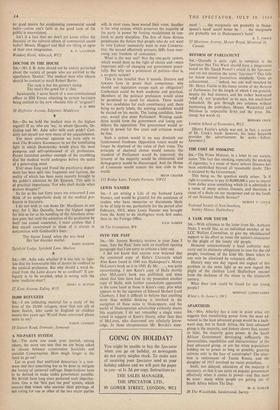A NO-PARTY SYSTEM
S1R,—The more one reads your journal, among others, the more one sees that we are being asked to choose between conservative Socialists and socialist Conservatives. How mush longer is the farce to go on?
Let us grant that undiluted democracy is a non- sense and that something has to be done to mitigate the lunacy of universal suffrage. Imperfections have to be devised to make stable government possible. We British have long since perfected such imperfec- tions. One is the 'first past the post' system, which ensures that voters who exercise their privilege of not voting for one or other of the two major parties will, in most cases, have wasted their votes. Another is the whip system, which preserves the majority of the party in power by forcing recalcitrants to con- form to party discipline. The first of these devices perpetuates the fiction that people who do not want to vote Labour necessarily want to vote Conserva- tive; the second effectively prevents MPs from exer- cising any freedom of conscience.
What is the way out? Not the one-party system, which would deny us the right of choice and—more important still—of changing our government peace- fully. But why not a profession of politics—that is, a no-party system?
This is less fanciful than it sounds. Doctors and lawyers have to prove their competence; why should our legislators escape such an obligation? Credentials could be both academic and practical. Members of the political profession would alone be permitted to stand for election. There would be two candidates for each constituency and, there being no party labels, the winning candidate would be elected on his merits. The losing candidate, how- ever, would also enter Parliament Winning candi- dates would form the government and losing can- didates the opposition. The government would re- main in power for five years and criticism would be free.
Such a system would in no way diminish our fundamental freedoms. Opposition voters would no longer be deprived of the value of their votes. The principle of electoral choice would remain; the standard of Parliament would be improved; the tyranny of the majority would be eliminated; and demagoguery would be discouraged. And the House of Commons would remain the best club in the world.










































 Previous page
Previous page